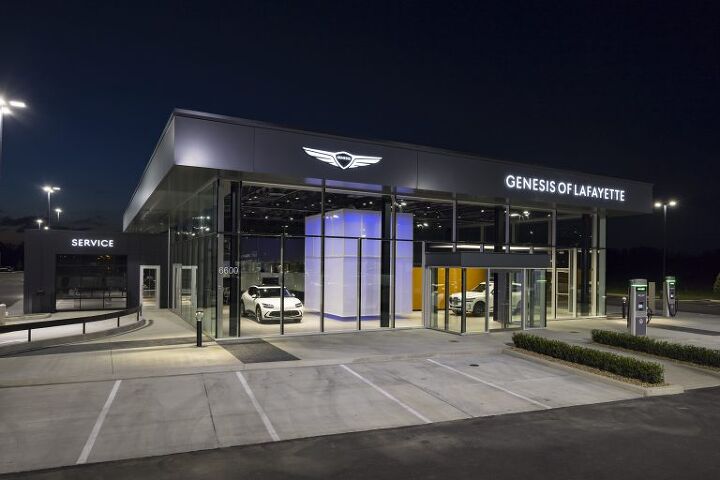Genesis Leaves the Nest With First Solo Store

Genesis is an interesting brand. Decades after Japanese automakers launched premium nameplates of their own, South Korea’s Hyundai decided to spin off one of its sedans into an entire luxury sub-brand in 2015. The resulting vehicles have been solid performers, representing excellent value for individuals in the market for something fancier. Genesis is building real luxury cars and working to differentiate those models from Hyundai Motor Groups’ mainstream products.
But it’s had to overcome plenty of obstacles. While Genesis’ product might be dunking on some of the other Asian luxury brands, achieving the same notoriety has been difficult for the fresh nameplate. The company also isn’t targeting Acura, Infiniti, and Lexus. Its sights are set on the Germans, with many vehicles already comparing favorably. But if Genesis is to become a serious rival, it needs to distance itself from the Hyundai and Kia models it traditionally shares a lot with — resulting in its very first standalone retail store in the United States.
The new dealership, located in Lafayette, Louisiana, represents an important phase in the brand’s evolution. Genesis has already distanced itself from the mass-market brand it spawned from with its product and can now do so physically with higher-end showrooms it has all to itself.
From Genesis:
At Genesis of Lafayette, customers are able to take full advantage of an automotive purchase and ownership journey tailored to them. Genesis of Lafayette puts customers’ time and convenience at the center of the experience. Customers can book an at-home test drive online, and even take delivery of their new vehicle at their residence or place of business.
Genesis of Lafayette features distinct brand elements, a transparent, open floorplan, an indoor vehicle delivery area, and infrastructure to support the upcoming portfolio of Electrfied Genesis models. Clients are welcomed into an all-new showroom of award-winning Genesis vehicles. To match the finely-crafted products, unique design elements are on full display, such as a private brand cube where customers may review material samples, vehicle specifications, and more in a stress-free environment.
“We are glad to partner with Arthur LeBlanc and Sterling Automotive Group on our first standalone retail facility in the United States,” said Claudia Marquez, chief operating officer of Genesis Motor North America. “I want to extend my thanks to the entire Sterling Automotive Group for creating a space beautifully designed and so befitting of our remarkable products.”
The store is said to be “the first of many planned retail facilities for the brand in the United States” Genesis won’t need to share. The company shared plans to launch six additional locations as soon as possible — all of which were said to be under construction — with an additional twenty dealerships in the early stages of planning.
It seems to be good news for the South Korean company. However, Genesis’ long-term success is hardly assured. In addition to still being the new kid on the block, it also spent its first few years focused on sedans. While hardly a problem for those with a strong preference for them, the body style has been falling out of favor as manufacturers began pursuing higher-margin SUVs and consumers started focusing on interior volume. Another potential pitfall is the fact that mid-tier luxury vehicles are typically sold to middle-class shoppers, a demographic that’s been shrinking since the 1970s.
But those problems aren’t unique to Genesis. Japanese luxury brands have similarly needed to update their portfolios while creating more distance between their mainstream counterparts. Meanwhile, the Germans appear to have decided that going downmarket was a mistake. There’s a lot of shuffling going on within this quadrant of the industry, providing Genesis with an opportunity it cannot afford to squander.
[Images: Genesis]

A staunch consumer advocate tracking industry trends and regulation. Before joining TTAC, Matt spent a decade working for marketing and research firms based in NYC. Clients included several of the world’s largest automakers, global tire brands, and aftermarket part suppliers. Dissatisfied with the corporate world and resentful of having to wear suits everyday, he pivoted to writing about cars. Since then, that man has become an ardent supporter of the right-to-repair movement, been interviewed on the auto industry by national radio broadcasts, driven more rental cars than anyone ever should, participated in amateur rallying events, and received the requisite minimum training as sanctioned by the SCCA. Handy with a wrench, Matt grew up surrounded by Detroit auto workers and managed to get a pizza delivery job before he was legally eligible. He later found himself driving box trucks through Manhattan, guaranteeing future sympathy for actual truckers. He continues to conduct research pertaining to the automotive sector as an independent contractor and has since moved back to his native Michigan, closer to where the cars are born. A contrarian, Matt claims to prefer understeer — stating that front and all-wheel drive vehicles cater best to his driving style.
More by Matt Posky
Latest Car Reviews
Read moreLatest Product Reviews
Read moreRecent Comments
- Dartman If one is so hellbent on drawing attention to themselves just mount a big “Trump 2024” or “Black Lives Matter” flag (your choice) on your truck and call it day. Lot cheaper, same result.
- AZFelix I'd buy a 'harlequin' edition if it was composed of a company's complete palette of greys and silver.Family had a couple of Pontiacs in teal and purple in years past. I was not a fan.My current ride is Lakeside Blue.
- Doc423 Rolling Coal is not a bad thing either.
- Ajla In high school I really wanted a yellow GTO.
- Lou_BC Sweet car.




































Comments
Join the conversation
My wife and I bought a new Santa Fe XL-Limited in 2017. We have FICOs over 800 and could have easily purchased any other vehicle equivalent, such as the Pilot or Highlander but decided on the Santa Fe. After agreeing on an outstanding price we go to sign the papers and my wife (a retired school teacher) notices the math doesn't add up. We had to take the Hyundai financing to get $3,500.00 in rebates (the good old days!) and the finance guy tried to put $600.00 key insurance and a few hundred dollars for "nitrogen" on the finance contract without telling us. After protest he took off those two items. This same store sells Genesis vehicles. OK..... The best thing Hyundai can do is break away the Genesis line and hopefully not end up with the same Dealership owners and car buying experience.
Of all the places one could have opened, I wouldn't have expected Lafayette, Louisiana. But then buyers in south Louisiana aren't probably so concerned about keeping up appearances.